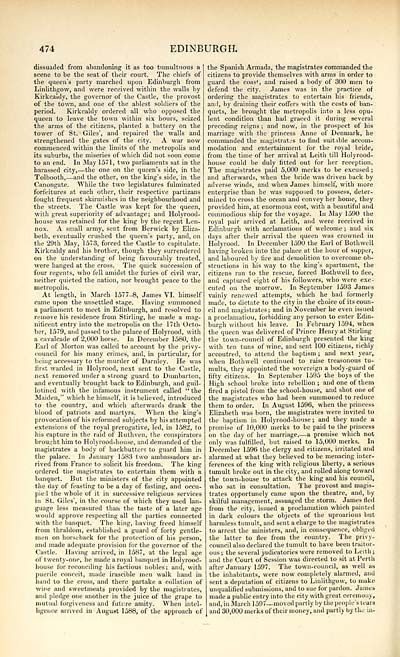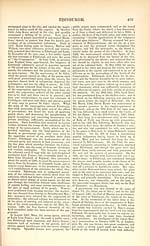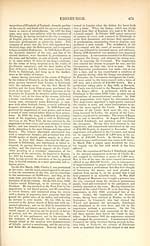Topographical, statistical, and historical gazetteer of Scotland > Volume 1
(566) Page 474
Download files
Complete book:
Individual page:
Thumbnail gallery: Grid view | List view

474
EDINBURGH.
dissuaded from abandoning it as too tumultuous a
scene to be the seat of tbeir court. The chiefs of
the queen's party marched upon Edinburgh from
Linlithgow, and were received within the walls by
Kirkcaldy, the governor of the Castle, the provost
of the town, and one of the ablest soldiers of the
period. Kirkcaldy ordered all who opposed the
queen to leave the town within six hours, seized
the arms of the citizens, planted a battery on the
tower of St. Giles', and repaired the walls and
strengthened the gates of the city. A war now
commenced within the limits of the metropolis and
its suburbs, the miseries of which did not soon come
to an end. In May 1571, two parliaments sat in the
harassed city, — the one on the queen's side, in the
Tolbooth, — and the other, on the king's side, in the
Canongate. While the two legislatures fulminated
forfeitures at each other, their respective partizans
fought frequent skirmishes in the neighbourhood and
the streets. The Castle was kept for the queen,
with great superiority of advantage; and Holyrood-
house was retained for the king by the regent Len-
nox. A small army, sent from Berwick by Eliza-
beth, eventually crushed the queen's party, and, on
the 29th May, 1573, forced the Castle to capitulate.
Kirkcaldy and his brother, though they surrendered
on the understanding of being favourably treated,
■were hanged at the cross. The quick succession of
four regents, who fell amidst the furies of civil war,
neither quieted the nation, nor brought peace to the
metropolis.
At length, in March 1577-8, James VI. himself
came upon the unsettled stage. Having summoned
a parliament to meet in Edinburgh, and resolved to
remove his residence from Stirling, he made a mag-
nificent entry into the metropolis on the 17th Octo-
ber, 1579, and passed to the palace of Holyrood, with
a cavalcade of 2,000 horse. In December 1580, the
Earl of Morton was called to account by the privy-
council for his many crimes, and, in particular, for
being accessary to the murder of Darnley. He was
first warded in Holyrood, next sent to the Castle,
next removed under a strong guard to Dumbarton,
and eventually brought back to Edinburgh, and guil-
lotined with the infamous instrument called "the
Maiden," which he himself, it is believed, introduced
to the country, and which afterwards drank the
blood of patriots and martyrs. When the king's
provocation of his reformed subjects by his attempted
extensions of the royal prerogative, led, in 158^, to
his capture in the raid of Ruthven, the conspirators
brought him to Holyrood-house, and demanded of the
magistrates a body of hackbutters to guard him in
the palace. In January 1583 two ambassadors ar-
rived from France to solicit his freedom. The king
ordered the magistrates to entertain them with a
banquet. But the ministers of the city appointed
the day of feasting to be a day of fasting, and occu-
pie:l the whole of it in successive religious services
in St. Giles', in the course of which they used lan-
guage less measured than the taste of a later age
would approve respecting all the parties connected
with the banquet. The king, having freed himself
from thraldom, established a guard of forty gentle-
men on horseback for the protection of his person,
and made adequate provision for the governor of the
Castle. Having arrived, in 1587, at the legal age
of twenty-one, he made a royal banquet in Holyrood-
house for reconciling his factious nobles ; and, with
puerile conceit, made irascible men walk hand in
hand to the cross, and there partake a collation of
wine and sweetmeats provided by the magistrates,
and pledge one another in the juice of the grape to
mutual forgiveness and future amity. When intel-
ligence arrived in August 1588, of the approach of
the Spanish Armada, the magistrates commanded the
citizens to provide themselves with arms in order to
guard the coasf, and raised a body of 300 men to
defend the city. James was in the practice of
ordering the magistrates to entertain his friends,
and, by draining their coffers with the costs of ban-
quets, he brought the metropolis into a less opu-
lent condition than had graced it during several
preceding reigns ; and now, in the prospect of his
marriage with the princess Anne of Denmark, he
commanded the magistrates to find suit.ible accom-
modation and entertainment for the royal bride,
from the time of her arrival at Leith till Holyrood-
house could be duly fitted out for her reception.
The magistrates paid 5,000 merks to be excused ;
and afterwards, when the bride was driven back by
adverse winds, and when James himself, with more
enterprise than he was supposed to possess, deter-
mined to cross the ocean and convey her home, they
provided him, at enormous cost, with a beautiful and
commodious ship for the voyage. In May 1590 the
royal pair arrived at Leith, and were received in
Edinburgh with acclamations of welcome ; and six
days after their arrival the queen was crowned in
Holyrood. In December 1590 the Earl of Bothwell
having broken into the palace at the hour of supper,
and laboured by fire and demolition to overcome ob-
structions in his way to the king's apartment, the
citizens ran to the rescue, forced Bothwell to flee,
and captured eight of his followers, who were exe-
cuted on the morrow. In September 1593 James
vainly renewed attempts, which he had formerly
made, to dictate to the city in the choice of its coun-
cil and magistrates; and in November he even issued
a proclamation, forbidding any person to enter Edin-
burgh without his leave. In February 1594, when
the queen was delivered of Prince Henry at Stirling
the town-council of Edinburgh presented the king
with ten tuns of wine, and sent 100 citizens, richly
accoutred, to attend the baptism ; and next year,
when Bothwell continued to raise treasonous tu-
mults, they appointed the sovereign a body-guard of
fifty citizens. In September 1595 the boys of the
High school broke into rebellion ; and one of them
fired a pistol from the school-house, and shot one of
the magistrates who bad been summoned to reduce
them to order. In August 1596, when the princess
Elizabeth was born, the magistrates were invited to
the baptism in Holyrood-house ; and they made a
promise of 10,000 merks to be paid to the princess
on the day of her marriage. — a promise which not
only was fulfilled, but raised to 15,000 merks. In
December 1596 the clergy and citizens, irritated and
alarmed at what they believed to be menacing inter-
ferences of the king with religious liberty, a serious
tumult broke out in the city, and rolled along toward
the town-house to attack the king and his council,
who sat in consultation. The provost and magis-
trates opportunely came upon the theatre, and, by
skilful management, assuaged the storm. James fled
from the city, issued a proclamation which painted
in dark colours the objects of the uproarious but
harmless tumult, and sent a charge to the magistrates
to arrest the ministers, and, in consequence, obliged
the latter to flee from the country. The privy-
council also declared the tumult to have been traitor-
ous ; the several judicatories were removed to Leith ;
and the Court of Session was directed to sit at Pertli
after January 1597. The town-council, as well as
the inhabitants, were now completely alarmed, and
sent a deputation of citizens to Linlithgow, to make
unquabfied submissions, and to sue for pardon. James
made a public entry into the city with great ceremony,
and, in March 1597 — moved partly by the people's tears
and 30,000 merks of their money, and partly by. the in-
EDINBURGH.
dissuaded from abandoning it as too tumultuous a
scene to be the seat of tbeir court. The chiefs of
the queen's party marched upon Edinburgh from
Linlithgow, and were received within the walls by
Kirkcaldy, the governor of the Castle, the provost
of the town, and one of the ablest soldiers of the
period. Kirkcaldy ordered all who opposed the
queen to leave the town within six hours, seized
the arms of the citizens, planted a battery on the
tower of St. Giles', and repaired the walls and
strengthened the gates of the city. A war now
commenced within the limits of the metropolis and
its suburbs, the miseries of which did not soon come
to an end. In May 1571, two parliaments sat in the
harassed city, — the one on the queen's side, in the
Tolbooth, — and the other, on the king's side, in the
Canongate. While the two legislatures fulminated
forfeitures at each other, their respective partizans
fought frequent skirmishes in the neighbourhood and
the streets. The Castle was kept for the queen,
with great superiority of advantage; and Holyrood-
house was retained for the king by the regent Len-
nox. A small army, sent from Berwick by Eliza-
beth, eventually crushed the queen's party, and, on
the 29th May, 1573, forced the Castle to capitulate.
Kirkcaldy and his brother, though they surrendered
on the understanding of being favourably treated,
■were hanged at the cross. The quick succession of
four regents, who fell amidst the furies of civil war,
neither quieted the nation, nor brought peace to the
metropolis.
At length, in March 1577-8, James VI. himself
came upon the unsettled stage. Having summoned
a parliament to meet in Edinburgh, and resolved to
remove his residence from Stirling, he made a mag-
nificent entry into the metropolis on the 17th Octo-
ber, 1579, and passed to the palace of Holyrood, with
a cavalcade of 2,000 horse. In December 1580, the
Earl of Morton was called to account by the privy-
council for his many crimes, and, in particular, for
being accessary to the murder of Darnley. He was
first warded in Holyrood, next sent to the Castle,
next removed under a strong guard to Dumbarton,
and eventually brought back to Edinburgh, and guil-
lotined with the infamous instrument called "the
Maiden," which he himself, it is believed, introduced
to the country, and which afterwards drank the
blood of patriots and martyrs. When the king's
provocation of his reformed subjects by his attempted
extensions of the royal prerogative, led, in 158^, to
his capture in the raid of Ruthven, the conspirators
brought him to Holyrood-house, and demanded of the
magistrates a body of hackbutters to guard him in
the palace. In January 1583 two ambassadors ar-
rived from France to solicit his freedom. The king
ordered the magistrates to entertain them with a
banquet. But the ministers of the city appointed
the day of feasting to be a day of fasting, and occu-
pie:l the whole of it in successive religious services
in St. Giles', in the course of which they used lan-
guage less measured than the taste of a later age
would approve respecting all the parties connected
with the banquet. The king, having freed himself
from thraldom, established a guard of forty gentle-
men on horseback for the protection of his person,
and made adequate provision for the governor of the
Castle. Having arrived, in 1587, at the legal age
of twenty-one, he made a royal banquet in Holyrood-
house for reconciling his factious nobles ; and, with
puerile conceit, made irascible men walk hand in
hand to the cross, and there partake a collation of
wine and sweetmeats provided by the magistrates,
and pledge one another in the juice of the grape to
mutual forgiveness and future amity. When intel-
ligence arrived in August 1588, of the approach of
the Spanish Armada, the magistrates commanded the
citizens to provide themselves with arms in order to
guard the coasf, and raised a body of 300 men to
defend the city. James was in the practice of
ordering the magistrates to entertain his friends,
and, by draining their coffers with the costs of ban-
quets, he brought the metropolis into a less opu-
lent condition than had graced it during several
preceding reigns ; and now, in the prospect of his
marriage with the princess Anne of Denmark, he
commanded the magistrates to find suit.ible accom-
modation and entertainment for the royal bride,
from the time of her arrival at Leith till Holyrood-
house could be duly fitted out for her reception.
The magistrates paid 5,000 merks to be excused ;
and afterwards, when the bride was driven back by
adverse winds, and when James himself, with more
enterprise than he was supposed to possess, deter-
mined to cross the ocean and convey her home, they
provided him, at enormous cost, with a beautiful and
commodious ship for the voyage. In May 1590 the
royal pair arrived at Leith, and were received in
Edinburgh with acclamations of welcome ; and six
days after their arrival the queen was crowned in
Holyrood. In December 1590 the Earl of Bothwell
having broken into the palace at the hour of supper,
and laboured by fire and demolition to overcome ob-
structions in his way to the king's apartment, the
citizens ran to the rescue, forced Bothwell to flee,
and captured eight of his followers, who were exe-
cuted on the morrow. In September 1593 James
vainly renewed attempts, which he had formerly
made, to dictate to the city in the choice of its coun-
cil and magistrates; and in November he even issued
a proclamation, forbidding any person to enter Edin-
burgh without his leave. In February 1594, when
the queen was delivered of Prince Henry at Stirling
the town-council of Edinburgh presented the king
with ten tuns of wine, and sent 100 citizens, richly
accoutred, to attend the baptism ; and next year,
when Bothwell continued to raise treasonous tu-
mults, they appointed the sovereign a body-guard of
fifty citizens. In September 1595 the boys of the
High school broke into rebellion ; and one of them
fired a pistol from the school-house, and shot one of
the magistrates who bad been summoned to reduce
them to order. In August 1596, when the princess
Elizabeth was born, the magistrates were invited to
the baptism in Holyrood-house ; and they made a
promise of 10,000 merks to be paid to the princess
on the day of her marriage. — a promise which not
only was fulfilled, but raised to 15,000 merks. In
December 1596 the clergy and citizens, irritated and
alarmed at what they believed to be menacing inter-
ferences of the king with religious liberty, a serious
tumult broke out in the city, and rolled along toward
the town-house to attack the king and his council,
who sat in consultation. The provost and magis-
trates opportunely came upon the theatre, and, by
skilful management, assuaged the storm. James fled
from the city, issued a proclamation which painted
in dark colours the objects of the uproarious but
harmless tumult, and sent a charge to the magistrates
to arrest the ministers, and, in consequence, obliged
the latter to flee from the country. The privy-
council also declared the tumult to have been traitor-
ous ; the several judicatories were removed to Leith ;
and the Court of Session was directed to sit at Pertli
after January 1597. The town-council, as well as
the inhabitants, were now completely alarmed, and
sent a deputation of citizens to Linlithgow, to make
unquabfied submissions, and to sue for pardon. James
made a public entry into the city with great ceremony,
and, in March 1597 — moved partly by the people's tears
and 30,000 merks of their money, and partly by. the in-
Set display mode to: Large image | Transcription
Images and transcriptions on this page, including medium image downloads, may be used under the Creative Commons Attribution 4.0 International Licence unless otherwise stated. ![]()
| Gazetteers of Scotland, 1803-1901 > Topographical, statistical, and historical gazetteer of Scotland > Volume 1 > (566) Page 474 |
|---|
| Permanent URL | https://digital.nls.uk/97444338 |
|---|
| Description | Volume first. A-H. |
|---|---|
| Attribution and copyright: |
|

